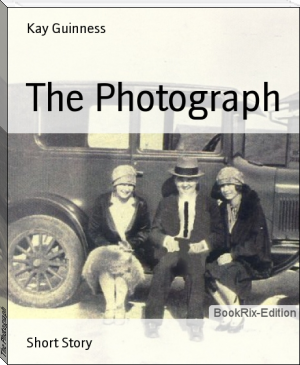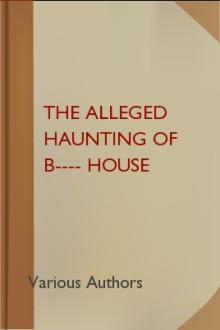Indian Ghost Stories - S. Mukerji (finding audrey .txt) 📗

- Author: S. Mukerji
- Performer: -
Book online «Indian Ghost Stories - S. Mukerji (finding audrey .txt) 📗». Author S. Mukerji
"I had expected as much" said Mr. Anderson bitterly, as he left the Railway Station.
"I would go to Captain Fraser and beg for some dinner. He is the only man who has got a family here and will be able to accommodate us" said he to his wife, and so off they started for a five mile run to the Cantonments. There was some trouble with the car on the way and they were detained for about an hour, and it was actually 8-30 in the evening when the Andersons reached Captain Fraser's place. Why, instead of going home from the Railway Station, Mr. Anderson went to Captain Fraser's place he himself could not tell.
When the Andersons reached Captain Fraser's place at half past eight in the evening, Mr. and Mrs. Fraser had not come back from the club. But they were expected every minute. It was in fact nine when the Captain and his wife turned up in a Hackney Carriage. They were surprised to see the Andersons. They had heard the story told by Atkins at the club. Anderson gave them his version. Of course, Captain Fraser asked them to stay to dinner. He said "I am very sorry I am late, but it could not be helped. When returning from the club my horse was alarmed at something. The coachman lost control and there was a disaster. But, thank God, nobody is seriously hurt."
Their carriage had, however, been so badly damaged that they had to get a hackney carriage to bring them home.
In India, specially in June, they are not particular about the dress. So Captain Fraser said they would sit down to dinner at once and, at a quarter after nine they all went in to dine. The Khansama stared at the uninvited guests. He knew that something had gone wrong with Anderson Saheb.
The soup was the first thing brought in and the trouble began as soon as it came. Captain Fraser's Khansama was an old hand at his business, but somehow he made a mess of things. He got so nervous about what he himself could not explain that he upset a full plate of soup that he had brought for Mr. Anderson not exactly on his head, but on his left ear.
Well the reader would understand the situation. There was a plateful of hot soup on Mr. Anderson's left ear. The soup should have got cold, because it had waited long for the Captain's return from the club, but the cook had very prudently warmed it up again and it had become very warm indeed. Mr. Anderson shouted and the Khansama let go the plate. It fell on the table in front of Mr. Anderson on its edge and rolled on. Next to Mr. Anderson was Mrs. Fraser, and there was a glass of iced-water in front of her. The rolling soup plate upset the glass, and the water and the glass and the plate all came down on Mrs. Fraser's lap, the iced-water making her wet through and through. She was putting on a muslin gown. She had to go and change. Mrs. Anderson at this point got up and said that they would not spoil the Frasers' dinner by their presence. She said that the curse of the Indian Fakir was on them and if they stayed the Frasers would have to go without dinner. Naturally she anticipated that some further difficulty would arise there when the next dish was brought in. The Frasers protested loudly but she dragged Mr. Anderson away. She had forgotten that she had had her lunch and her husband had not.
While going in their motor car from Mr. Fraser's house to their own they had to pass a bazaar on the way. In the bazar there was a sweetmeat shop. Mr. Anderson, whose condition could be better imagined than described asked his chauffeur to stop at the sweetmeat shop. It was a native shop with a fat native proprietor sitting without any covering upon his body on a low stool. As soon as he saw Mr. Anderson and his wife he rushed out of his shop with joined palms to enquire what the gentleman wanted. Mr. Anderson was evidently very popular with the native tradesmen and shop-keepers.
This shop-keeper had special reason to know Mr. Anderson, as it was the latter's custom to give a dinner to all his native workmen on Her Majesty's birthday, and this particular sweetmeat vendor used to get the contract for the catering. The birthday used to be observed in India on the 24th May and it was hardly a fortnight that this man had received a cheque for a pretty large amount from Mr. Anderson, for having supplied Mr. Anderson's native workmen with sweets.
Naturally he rushed out of his shop in that humble attitude. But in doing so he upset a whole dishful of sweets, and the big dish with the sweets went into the road-side drain. All the same the man came up and wanted to know the pleasure of the Saheb. Mr. Anderson told him that he was very hungry and wanted something to eat. "Certainly, Huzoor" said the Halwâi (Indian Confectioner) and fussily rushed in. He brought out some native sweets in a "dona" (cup made of leaves) but as misfortune would have it Mr. Anderson could not eat anything.
There was any amount of petroleum in the sweets. How it got in there was a mystery. Mr. Anderson asked his chauffeur to proceed. For fear of hurting the feeling of this kind old Halwâi Mr. Anderson did not do anything then; but scarcely had the car gone 200 yards when the "dona" with its contents untouched was on the road.
Mr. Anderson reached home at about half past ten. He expected to find no dinner at home. But he was relieved to hear from his bearer that dinner was ready. He rushed into his bath-room, had a cold bath and within five minutes was ready for dinner in the dining-room.
But the dinner would not come. After waiting for about 15 minutes the bearer (butler and foot man combined) was dispatched to the kitchen to enquire what the matter was. The cook came with a sad look upon his face and informed him that the dinner had been ready since 8-30 as usual, but as the Saheb had not returned he had kept the food in the kitchen and come out leaving the kitchen-door open. Unfortunately Mr. Anderson's dogs had finished the dinner in his absence, probably thinking that the master was dining out. In a case like this the cook, who had been in Mr. Anderson's service for a long time, expected to hear some hard words; but Mr. Anderson only laughed loud and long. The cook suggested that he should prepare another dinner, but Mr. Anderson said that it would not be necessary that night. The chauffeur subsequently informed the cook that the master and his wife had dined at Captain Fraser's, and finished with sweets at Gopal Halwai's shop. This explained the master's mirth to the cook's satisfaction.
What happened the next day to Mr. Anderson need not be told. It is too painful and too dirty a story. The fact remains that Mr. Anderson had no solid food the next day either. He thought he should die of starvation. He did not know how much longer the curse was going to last, or what else was in store for him.
On the morning of the third day the bearer came and reported that a certain Indian Fakir had invited Mr. Anderson to go and breakfast with him. How eagerly husband and wife went! The Fakir lived in a miserable hut on the bank of the river. He invited the couple inside his hut and gave them bread and water. Here was clean healthy looking bread after all, and Mr. Anderson never counted how many loaves he ate. But he had never eaten food with greater relish and pleasure in his life before. After the meal the Fakir who evidently knew Mr. Anderson said: "Saheb, you are a great man and a good man too. You are rich and you think that riches can purchase everything. You are wrong. The Giver of all things may turn gold into dust and gold may, by His order, lose all its purchasing capacity. This you have seen during the last two days. You have annoyed a man who has no gold but who has power. You think that the Deputy Commissioner has power—but he has not. The Deputy Commissioner gets his power from the King. The man whom you have offended got his power from the King of Kings.
"It is His pleasure that you should leave the station. The sooner you leave this place Saheb the better for you or you will starve. You can stay as long as you like here—but you will eat no food outside this hut of mine—you can try.
"You can go now and come back for your dinner when you require it—."
Mr. Anderson came back to the Fakir's cottage for his dinner, with his wife at nine in the evening.
Early, the next morning, he left the station and never came back.
Within a month he left India for good. The hospitable gentlemen of the station who had asked Mr. and Mrs. Anderson to have a meal with them will never forget the occasion.
This story, though it reads like a fairy tale, is nevertheless true.
All the European gentlemen of J—— knew it and if anyone of them happens to read these pages he will be able to certify that every detail is correct.
In this connection it will not be out of place to mention some of the strange doings of the once famous Hasan Khan, the black artist of Calcutta. Fifty years ago there was not an adult in Calcutta who did not know his name and had not seen or at least heard of his marvellous feats.
I have heard any number of wonderful stories but I shall mention only two here which, though evidently not free from exaggeration, will give an idea of what the people came to regard him as capable of achieving, and also of the powers and attributes which he used to arrogate to himself.
What happened was this.
There was a big reception in Government House at Calcutta. Now a native of Calcutta of those days knew what such a reception meant.
All public roads within half a mile of Government House were closed to wheeled and fast traffic.
The large compound was decorated with lamps and Chinese Lanterns in a manner that baffled description. Thousands of these Chinese Lanterns hung from the trees and twinkled among the foliage like so many coloured fire-flies. The drives from the gates to the building had rows of these coloured lanterns on both sides; besides, there were coloured flags and Union Jacks flying from the tops of the poles, round which were coiled wreaths of flowers, and which also served to support the ropes or wires from which these lanterns were suspended.
The main building itself was illuminated with hundreds of thousands of candles or lamps and looked from





Comments (0)